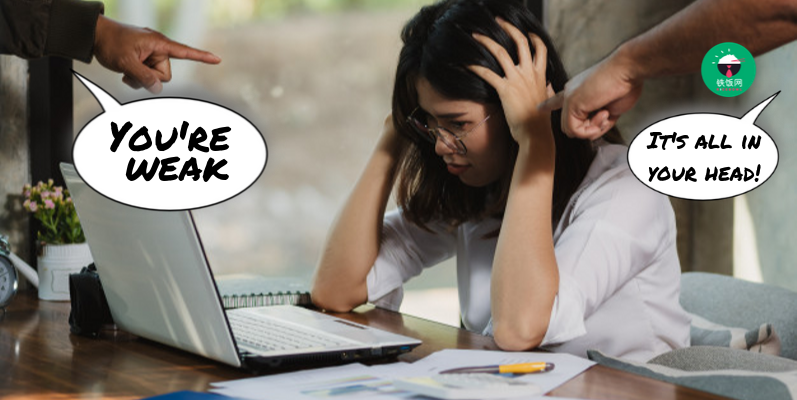Recently, K-Pop Sulli passed away due to depression. A lot of people don't understand how it is, so here is an article to shed some light on it.

How To Help People With Depression (What To Say And What Not To Say)
by David Blog
As a build off from this article, let’s focus on our surroundings. Most of us have someone with depression or any other form of mental illness in our lives. Sometimes we may not mean it or know it, but the way we say things could make the situation worse. So, here’s 5 things NOT to say to depressed people, and how to properly reply to them.

Stop Acting Crazy
The phrase might be said without thought, not intended to cause pain. But the result is acid on a scar to someone who already feels ‘less than’ due to an illness that is rarely viewed with the respect or understanding given to a person with a physical ailment.
Saying things like “stop acting crazy” trivializes the very real torment faced by a person with mental illness.
Eliminating ableist words such as “crazy” or “insane” is a small but vital way to reduce the stigmatizing impact of such language.
What To Do Instead
Instead of scoffing, “Ah Hock, you are so crazy!” be specific about the behavior you find objectionable like…
“Ah Hock when you don’t clean up your room, the place gets messy and smelly and you will get sick easier.”
Just Don’t Worry About It
Since a majority of Malaysians suffer from some form of mental illness, it is helpful to know the best ways to help someone who is suffering rather than to act like they’re making a mountain out of a molehill.
You wouldn’t dream of saying to someone with a leg injury, “Small matter only. Just keep walking!” So why do so many find it acceptable to say a person with an anxiety disorder, “Just don’t worry about it?”
The put-down results in trivialization of what someone feels. This type of language can make the person feel as if he or she is making a choice about these difficult emotions. People with anxiety disorders know they worry a lot.
It is better to walk away from an anxious person than it is to tell them they need to calm down—they know they need to calm down, and hearing you say it only adds guilt and failure to the pile of emotions that was already overwhelming them.
What To Do Instead
The key is not to seem judgmental.
Use a supportive phrase such as “This must be so hard for you,” or “I’m here if you want to talk about how you feel.”
Just showing you have empathy and want to lend an ear and not lecture or taunt is the calming influence that can help the person versus alienate or cause further anxiety.
When your loved one is feeling calmer, perhaps he or she will be open to discussing options for seeking help.
It’s All In Your Head
Saying something like this gives off the feeling that you are belittling the matter.
It is like telling someone who just broke up that the pain they feel is also just in their head.
Just because a pain is not seen does not mean it isn’t there, emotional trauma is very real, especially for people who suffer from mental illness.
What To Do Instead
Instead of trying to convince them that it is fake and in their heads, try to empathize with what they are going through.
If you don’t really understand what it is they’re feeling, you can say something like “I may not know exactly what you are going through, but I am here for you.”
Sometimes, even a little re-affirmation goes a long way, as it makes people feel like they are not alone.
Therapy Is For Weak People
In asian culture, we think that mental illness and therapy is a sign of weakness.
The reason why our generation suffers so much from these illnesses is due to the fact our parents, friends and family may turn around and say that we are weak when we open up about it.
Calling someone weak in their darkest times is one of the worst things you can do to them. Such a statement is a horrific reinforcement of the negative stigma and reduces the chances of people seeking help while increasing their overall illness.
If you insist on saying this harmful phrase to someone clearly suffering, you need to look at your own issues and prejudices.
What To Do Instead
A few choices: Say nothing. Bite your tongue.
If pressed on the issue, say something like, “I’m not sure how I would handle what you’re going through but if therapy seems a viable option that can help you, I’m all for it.”
Things Will Get Better Tomorrow / Just Be Happy Lah
This sentiment is often issued in a heartfelt manner intended to be helpful. However, to someone with a major depressive or anxiety disorder to whom every moment of every day is an excruciating ordeal, it feels like a slap in the face.
It also makes the person saying it appear to have no desire to really relate to nor understand what mental illness feels like.
What To Do Instead
Again, rather than offer unwanted and unhelpful advice, validate the person’s feelings, no matter how elevated or exaggerated they seem: “That must really be rough to feel you messed up so badly. I’m here to listen.”
It can be really difficult to speak to someone dealing with a mental illness—not because of what they are experiencing, but because it’s hard to find the right words and it’s easy to feel like you are not saying or doing enough to help.
The above statements are rarely made out of malice, but rather because it can be easy to fall back on clichés when you are struggling to find the right words. Try to use the substitute language listed and work hard to be present and let your peers, coworkers, and loved ones know that you are listening to them.
